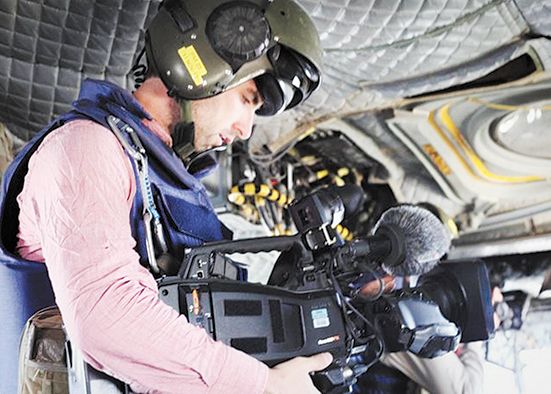I had to end call and go to bunker
I had to end call and go to bunker
9 March 2022

A BBC cameraman, who beamed pictures from war-torn Kyiv in Ukraine as the Russian army tried to occupy the city, is returning to his home near Crossgar.
David McIlveen worked with presenter Clive Myrie last week for the BBC’s flagship News at Ten, broadcast live from Kyiv just before the Ukrainian capital came under shellfire.
The award-winning picture correspondent returned to London yesterday after spending four weeks in Ukraine.
He hopes to get home over the weekend and to be with his wife, Emma, and children George and Rose, as well as his parents, George and Irene, who live in Killinchy, and his sister, Karen.
As David and his team were leaving Ukraine via Romania, another BBC team were heading to take over their coverage slot at Lviv. The 39 year-old initially covered the build-up of Russian tanks and soldiers along the border with renowned broadcaster Fergal Keane.
He then teamed up with Myrie to record the start of the invasion and subsequent events as the Russian army directed its full military might towards securing Kyiv.
David told the Recorder how the consistent shelling of Kyiv at night was having a severe psychological effect, as well as the physical damage on the city’s residents.
“The Russians know exactly what they are doing, with their bombardment of the city at night,” he said.
“There is great psychological pressure from listening the sirens go off over and over again at night, not knowing what you are going to face in the morning.”
He described how a shell hit a building just a block away from him while he was having a “reassuring” telephone chat with his wife several nights ago.
“My wife was understandably getting a bit worried so I went up the top of the hotel where we were staying and where we present the news programme,” he said.
“There I was doing a Facetime call with her, trying to reassure her that I was safe when a shell literally hit a building just a block away from where I was.
“I just had to end the call and get down to the bunker where we are staying.”
David said that his days in Kyiv started around 8am when he and Clive Myrie would would start to move around the city to investigate what had happened to the city overnight.
“It’s a job where you have to get out and about and find out what has happened and allow people to tell their stories. It’s important for us to be able to witness what is happening in Ukraine,” he explained.
He said that while they would travel in a mini-van to certain areas of the city, they felt safer approaching some checkpoints by foot due to a potential danger from Ukrainian reservists.
“We felt it was better not to drive up to these checkpoints in a blacked-out minivan as the people manning these literally have had one or two days of training, then be given an AK-47 and would get a bit nervous if a minivan they didn’t know pulled up as there’s so many saboteurs.
“We find it safer to walk around the areas and up to checkpoints as we can been seen from a distance so they can see we are press.”
He and the rest of a small production crew — made smaller as the days went on as non-essential staff were sent home due to the rising safety risks — worked long days, covering stories during the day and then preparing for the live news programme.
Because of the time difference, the BBC News at Ten started at midnight in Kyiv, ending at 1am, with the crew having to remove all their equipment to a safe place before being able to rest.
He spoke with pride at how he, Myrie and their satellite operators were able to pull off a live one-hour broadcast from a city actively under siege.
“I don’t think it’s very been done before, maybe a live 10-minute report, but not a whole programme and we are all pleased at being able to pull it off, particularly as so many things could have gone wrong.”
David won Camera Operator of the Year at last year’s Royal Television Society Awards for the reports he and Myrie did special reports for News at Ten during the pandemic, including a series from the coronavirus wards at the Royal London Hospital.
In his 16 years with the BBC, he has also covered the war in Afghanistan and US Presidential elections.
His mother, Irene, spoke of her pride in her son’s work.
“It’s hard to watch his reports when he is away, particularly if it’s a dangerous place like the Ukraine, but it’s something that he always wanted to do and I’m very proud of him,” she said
She said of the former Killinchy Primary School pupil: “When he’s home, all he wants to be is on the sea in his boat, that’s where he’s happiest.”
After resting at home for some time, David expects to be sent back to Ukraine.


